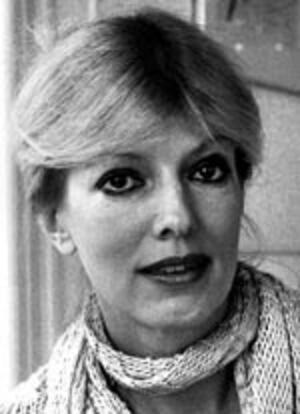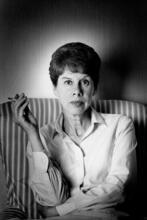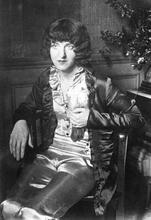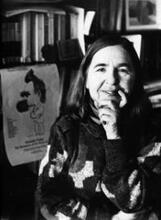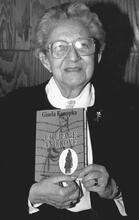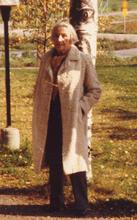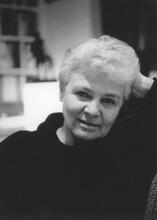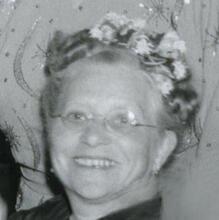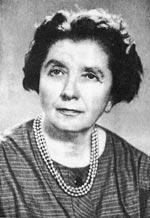Suzanne Brøgger
The provocative Danish writer Suzanne Brøgger had only one Jewish grandparent, her mother's father. Yet when Germany occupied her homeland the family was forced to flee. Years later, she wrote: "I don’t believe in ‘identity’ as such, Jewish or otherwise, but as long as there is antisemitism in the world, I will... claim my Jewish heritage." She is shown here on August 1, 1985.
Photographer: Marina Allemano.
Suzanne Brøgger was born in 1944 in Nazi-occupied Denmark. Her firsthand experience with the effects of discrimination and displacement have largely impacted her literary work. First a journalist and then a cultural critic, from early on she was notable for her experimentation with style and authentically subjective analysis of contemporary life in Denmark. In 1973, Brøgger became an overnight celebrity in Denmark when her first book of essays was published with the provocative title Fri os fra kærligheden (Deliver Us from Love), followed by a second anthology, Kærlighedens Veje og Vildveje (Love’s Paths and Pitfalls), in 1975. In 1992 she won the Scene Drama Award for best play (After the Orgy), and in 1997 she became a member of the Danish Academy.
Jewish Ancestry and Identity
“In my Buddhist way of thinking, I don’t believe in ‘identity’ as such, Jewish or otherwise, but as long as there is antisemitism in the world, I will—like Arthur Koestler—claim my Jewish heritage,” wrote Suzanne Brøgger to an acquaintance. According to The legal corpus of Jewish laws and observances as prescribed in the Torah and interpreted by rabbinic authorities, beginning with those of the Mishnah and Talmud.halakhah, Brøgger is not a Jew. Her biological father, Ove Preis, was a non-Jew, and her mother, Lilian Henius, was the daughter of an assimilated Jewish businessman Arne Henius and his non-Jewish wife Kate. However, racists do not adhere to the more subtle technicalities of identity. When Brøgger’s maternal family was faced with the realities of the Holocaust in German-occupied Denmark during World War II, they, along with many other Danes of full or partial Jewish background, had to flee to neutral Sweden in 1943. As a child born during the Occupation, Brøgger experienced first hand the effects of discrimination and displacement, which she recorded in several essays about her ancestry and in the novel Jadekatten. En slægtssaga (The Jade Cat: A Family Saga, 1997).
Starting the saga with an account of her Jewish great-great-grandfather Isidor Henius, who literally walked from Poland to Denmark in 1837 and eventually founded the famous distillery that to this day produces the most Danish of all Danish institutions, Aalborg Aquavit, Brøgger explores the many themes surrounding ethnic, racial, and cultural identity: multiculturalism, the myth of cultural purity, assimilation, non-assimilation, antisemitism, mixed marriages, the survivor-complex, denial of Jewishness, revival of orthodoxy, and the family Lit. (Greek) "dispersion." The Jewish community, and its areas of residence, outside Erez Israel.Diaspora. The novel was very well received in Denmark and has to date been translated into Dutch, Norwegian, Swedish, German, and English.
Early Literary Career and Success
Brøgger became a celebrity overnight in her native Denmark in 1973 when her first book of essays was published with the provocative title Fri os fra kærligheden (Deliver Us from Love), followed by a second anthology, Kærlighedens Veje og Vildveje (Love’s Paths and Pitfalls), in 1975. In a mode that blends fact and fiction and resists generic classifications, Brøgger began her life-long project as an autobiographical writer who “lives as she writes and writes as she lives,” as she notes in an essay from 1986. First a journalist and then a polemicist and cultural critic, she decided early on to experiment with style and to draw on her own experiences for authentic and subjective analysis of contemporary life in Denmark and the many exotic places she had visited or lived in. In an interview with Laura Luise Schultz in the Danish magazine Ud og se, she declares: “I don’t have talents for writing in an ordinary fashion … about some one called Åse who wakes up one morning at three in the town of Faaborg.” Fiction as such is not her domain. Instead she scandalized some readers with renditions of gang rape, lesbianism, exhibitionism, family dysfunctions, and various other taboo topics; however, the equally radical Henry Miller claimed in a letter to Brøgger that she was “better than Germaine Greer or Gloria Steinem” and wrote to her American publisher Delacorte Press that “not since the days of Rabelais have I read anything, by man or woman, as daring and courageous as this book by a Danish woman.” Because Brøgger is also glamorous and a strong individualist, she was unpopular with the militant feminist group, the Redstockings, in the 1970s and 1980s, although she did receive the Mathilde Prize in 1996 from Dansk kvindesamfund (Danish Women’s Society) for her “continuous insistence on the worthiness of being a woman.”
Brøgger has always been interested in questions of identity, selfhood, and the nature of consciousness, but it was not until the publication of the essay collection Den pebrede susen. Flydende fragmenter og fixeringer (The Peppered Sough: Fluid Fragments and Fixations) in 1986 that she established herself as a philosophical writer. In a retrospective essay about her writing, she acknowledges her debt to Søren Kierkegaard whose oeuvre inspired her to explore and develop her own Self through an aesthetic phase in the novel Crème fraiche (1978), followed by a study in repetition in the short novel En gris som har været oppe at slås kan man ikke stege (A Fighting Pig’s Too Tough to Eat, 1979) and a probe of the ethical stage in the long novel Ja (Yes, 1984). Yet, unlike Kierkegaard, her spiritual development has taken her to a metaphysical world view that is inclusive rather than exclusive, visionary and immediate rather than bookish and dogmatic, monistic rather than dualistic. A variety of religious figures, philosophers and mystics from the ancient Nordic Seeress through to the Buddha, Spinoza, and renegade scientists such as David Bohm and Rupert Sheldrake have all influenced her increasingly syncretic approach to metaphysical queries. Her later autobiographical novels Transparence (1993) and Linda Evangelista Olsen (2001) in particular reflect her departure from Kierkegaard.
Early Life and Family
When her maternal grandfather and most of his family fled to Sweden in 1943 in order to avoid Theresienstadt, Brøgger’s maternal grandmother stayed in Copenhagen to run the family business. Brøgger’s mother also stayed behind and conveniently married a non-Jew to protect her partial Semitic identity. Suzanne was thus born in Copenhagen on November 18, 1944. Her early childhood was problematic because of an immature father and an unstable mother who ended the marriage when Brøgger was six and her sister four years old. The same year the mother married Svend Brøgger, who eventually adopted the two girls. Lilian and Svend Brøgger also had two sons.
The second family proved to be extremely dysfunctional as the mother became suicidal and negligent of the four children. The story of the unbalanced and psychologically abusive mother figure appears again and again in Brøgger’s writing, most notably in Jadekatten and Linda Evangelista Olsen. Until she was fourteen Brøgger attended an experimental school, Bernadotteskolen, in the tradition of A. S. Neill’s Summerhill School, and continued her education partly at an academic academy in Copenhagen and partly in Anglophone schools in Colombo, Sri Lanka, and Bangkok, Thailand, where her stepfather had taken an administrative job with the World Health Organization. While a teenager in Bangkok she developed into a stunning beauty and worked briefly as a model in Thailand and later in Denmark. With her mother’s knowledge she became the mistress of a French diplomat in Bangkok who introduced her to the great works of world literature as well as to his own philosophical-erotic fiction, which he published under the pseudonym Emmanuelle Arsan.
Brøgger returned to Denmark to complete her schooling at Th. Langs Boarding School, from which she graduated in 1964 with a senior matriculation. While sporadically visiting her family on and off in Thailand, India, Afghanistan, and Algeria, she studied French and Russian from 1965 to 1970 at the University of Copenhagen but did not finish the program. In 1968 she also had a short-lived acting career at the Royal Theatre in Copenhagen, where she played the beautiful Helen in Shakespeare’s Troilus and Cressida. While still a university student she pursued a career in journalism that took her to countries such as Laos, Vietnam, the Soviet Union, Uzbekistan, Israel, and Lebanon. Her essays and articles were published in the anthology Brøg. 1965–1980 (Brew. 1965–1980) in 1980. Since 1970 she has resided in an old schoolhouse in the Danish countryside of West Sjælland.
Later Career and Literary Legacy
Even though Brøgger was an early spokeswoman for the sexual revolution, she later became a harsh critic of the consequences of a promiscuous society. In a series of essays titled “Virus 1, 2, 3” of 1986, reprinted in Kvælstof. 1980–1990 (Nitrogen:1980–1990), she uses the tropes of AIDS and the HIV virus to illuminate the connection between sexuality and death, a position that drew criticism from the gay community. The play Efter orgiet. En tragedie (After the Orgy: A Tragedy), which was commissioned by the royal theater in Stockholm in 1991 and directed by Bibi Anderson, is likewise a requiem mass for the sexual excesses of the 1960s and 1970s. Also in 1986, the woman who had previously denounced the institution of marriage and conventional family life gave birth at the age of forty-one to a daughter whose father, Keld Zeruneith, an author and professor of literature, she married in 1991.
With more than twenty books to her name, Brøgger has received many awards and prizes including the Scena Drama Award for best play (After the Orgy) in 1992 in , D.C. She became a member of the Danish Academy in 1997, the most recent of only six women ever elected to this institution, and in May 2003 she had the opportunity to speak to the members—“Les immortels”—of L’Académie française in Paris, an honor bestowed on very few women since the founding of the Academy in 1635.
SELECTED WORKS BY SUZANNE BRØGGER
Novels
Creme fraiche. En føljeton (1978).
En gris som har været oppe at slås kan man ikke stege (1979) (English translation: A Fighting Pig’s Too Tough to Eat and Other Prose Texts by Suzanne Brøgger, 1997). The translation also includes fourteen essays from Løvespor; Ja. Føljeton (1984).
Jadekatten. En slægtssaga (1997) (English translation: The Jade Cat, 2004).
Linda Evangelista Olsen (2001).
Transparence. Føljeton (1993).
Anthologies of Essays and Short Stories
Brøg. 1965–1980 (1980).
Den pebrede susen. Flydende fragmenter og fixeringer (1986).
Fri os fra kærligheden (1973) (English translation: Deliver Us From Love, 1977).
Kvælstof 1980–1990 (1990).
Kærlighedens veje og vildveje (1975).
Løvespor. Udvalgte essays (1995).
Sejd. Artikler og essays 1990–2000 (2000).
Poetry
Lotusøje (1999).
Tone. Epos (1981).
Plays
Dark (1994, unpublished). (English translation: Dark, 1995, unpublished).
Efter orgiet. En tragedie (1991). (English translation: After the Orgy. A Tragedy, 1992, unpublished).
Children’s Books
Min verden i en nøddeskal. Illustrated by Fleur Brofos Asmussen (1991); Paradisets mave. Illustrated by Fleur Brofos Asmussen (1993).
Miscellaneous Works
To My Danish Sheherazade: A Visit With and Correspondence From Henry Miller. Limited edition. Ann Arbor, Michigan: 1988.
Allemano, Marina. “Figures, True Stories and Literary Patchwork: The Brøggeresque Subject.” Scandinavica: An International Journal of Scandinavian Studies 32.2 (1993): 203–225.
Allemano, Marina. Introduction to A Fighting Pig’s Too Tough to Eat and Other Prose Texts, by Suzanne Brøgger. Translated by Marina Allemano. Norwich (UK): 1997.
Allemano, Marina. “Suzanne Brøgger and Eros.” Scandinavian-Canadian Studies/Études scandinaves au Canada 3 (1988): 61–72.
Allemano, Marina. Suzanne Brøgger: en introduction. Copenhagen: Gyldendal, 2004.
Arndal, Lars S. “The Courage to See.” Danish Literary Magazine (The Danish Literature Information Center) 12 (1997): 4.
De Francesco, Scott. “The Reception of Suzanne Brøgger in Denmark and the United States.” In Literary Communication and Reception, edited by Zorau Konstantinovic, Manfred Naumann, and Hans Robert Jauss, 371–375. Innsbruck: 1980.
Geng, Veronica. “‘Illuminating the Odd Assumption.’ Deliver Us From Love: A Radical Feminist Speaks Out.” Ms. Magazine (February 1977): 40–41, 45.
Houe, Poul. “Inge Eriksen and Suzanne Brøgger.” In A History of Danish Literature, edited by Sven H. Rossel, 517–519. Lincoln and London: 1992.
Kistrup, Jens. “Suzanne Brøgger: You Shouldn’t Be Allowed to Put up with It—!” In Out of Denmark: Isak Dinesen/Karen Blixen 1885–1985 and Danish Women Writers Today, edited by Bodil Wamberg, 77–88. Copenhagen: 1985.
Mosey, Chris. “The Demise and Fall of the Family as Predicted by Danish Writer Suzanne Brøgger.” Scanorama (June 1983): 32–34.
Riis, Merete. “The Emergence of Women in Literature.” Denmarkings: Danish Literature Today. Copenhagen: 1982, 14–15.
Tresher, Tanya. “Suzanne Brøgger.” In Twentieth-Century Danish Writers. Edited by Marianne Stecher-Hansen, 81–88. Dictionary of Literary Biography, vol. 214. Detroit: 1999.
Woods, Gurli Aagaard. "From Postmodern Fragmentation to Rebirth: Suzanne Brøgger's Work from the Early 1990s." Scandinavian Studies 76, no. 2 (2004): 257-78.
Zeuthen, Louise. Krukke: en biografi om Suzanne Brøgger. København: Gyldendal, 2014.

